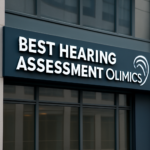If you’re considering a hearing assessment in Toronto, you’re taking an important step towards better understanding your hearing health. Whether you’re experiencing signs of hearing loss or simply want to ensure your hearing is in good shape, getting a hearing test is essential. In this blog, we’ll walk you through what to expect during your first hearing assessment at one of the best hearing clinics in Toronto.
Step 1: Booking Your Appointment
The first step to your hearing assessment is scheduling your appointment. Many of the best hearing clinics in Toronto offer online booking for convenience, but you can also schedule a consultation over the phone. When booking your appointment, you may be asked to fill out a pre-assessment questionnaire, which helps the clinic understand your medical history, any hearing-related concerns, and the symptoms you may be experiencing. This helps audiologists tailor the assessment to your specific needs.
Step 2: Arriving at the Clinic
On the day of your appointment, arrive at the clinic a little early to complete any paperwork or forms required by the clinic. If you’re unsure about what to bring, it’s always a good idea to have a list of any medications you’re taking and any previous medical records related to your hearing health. This will provide the audiologist with a more comprehensive picture of your health.
Step 3: A Comprehensive Consultation with Your Audiologist
Once you’re in the clinic, you’ll meet with a licensed audiologist who will conduct a thorough consultation to understand your hearing history. The audiologist will ask you questions about any hearing difficulties you might have, such as:
-
Difficulty hearing in noisy environments
-
Struggling to hear certain frequencies (e.g., high-pitched sounds)
-
Tinnitus or ringing in the ears
-
Family history of hearing loss
This consultation is an important part of the process, as it helps the audiologist tailor the hearing assessment to your individual needs and ensure the most accurate results.
Step 4: The Hearing Test Begins
Next, you’ll undergo a series of tests designed to assess different aspects of your hearing. These tests are non-invasive and typically include the following:
Pure Tone Audiometry
This is the most common test performed during a hearing assessment. You’ll be seated in a soundproof booth, and you’ll wear headphones that emit various tones at different frequencies and volumes. Your task is to indicate when you can hear the sound, which helps the audiologist measure your hearing threshold.
Speech Audiometry
This test assesses how well you can hear and understand speech at different volume levels. The audiologist will play recorded words or sentences, and you’ll be asked to repeat them. This test is helpful in understanding how your hearing ability affects real-world communication.
Tympanometry
Tympanometry measures the movement of your eardrum in response to pressure. It helps the audiologist determine if there is any fluid or blockage in the middle ear, which can affect hearing.
Bone Conduction Testing
In some cases, the audiologist may use bone conduction testing to determine if the hearing loss is due to issues with the outer or middle ear or if the issue lies within the inner ear.
Step 5: Review of Results
After the tests are complete, the audiologist will go over the results with you in detail. They will provide you with a hearing test report, which shows your hearing thresholds across various frequencies. Based on the results, the audiologist will discuss whether your hearing is within normal limits or if there is any degree of hearing loss.
If the results show some level of hearing loss, the audiologist may recommend further steps, such as hearing aids, assistive listening devices, or additional treatments. They may also suggest lifestyle changes or protective measures if the hearing loss is related to noise exposure or other preventable factors.
Step 6: Treatment Options and Next Steps
If your hearing test indicates that you could benefit from hearing aids or other hearing devices, the audiologist will discuss your options with you. Toronto’s top hearing clinics offer a wide range of hearing aids with various features, such as Bluetooth connectivity, rechargeable batteries, and different styles to suit your lifestyle and preferences.
In addition to hearing aids, the audiologist may also recommend regular follow-up appointments to monitor your hearing and make adjustments to your hearing aids if needed. Some clinics also offer counseling and rehabilitation services to help you adjust to your hearing aids and improve communication skills.
Step 7: Follow-up and Care
Your first hearing assessment is just the beginning of your journey towards better hearing. Many of the best hearing clinics in Toronto offer ongoing support, including follow-up assessments to ensure that your hearing needs are being met. Whether you need to adjust your hearing aids or simply check on your hearing health, follow-up appointments ensure that you stay on top of any changes to your hearing.
Why Choose the Best Hearing Assessment in Toronto?
Toronto boasts some of the Best Hearing assessment in Toronto , with state-of-the-art equipment and highly trained audiologists. Whether you’re experiencing hearing issues or just looking for a routine check-up, choosing the right clinic ensures accurate results, personalized care, and a comprehensive approach to your hearing health.
In conclusion, a hearing assessment is a simple and important process that provides valuable insights into your hearing health. By knowing what to expect, you can feel confident and prepared for your first visit to a Toronto hearing clinic. Don’t wait—schedule your hearing assessment today and take the first step toward protecting your hearing for years to come.

